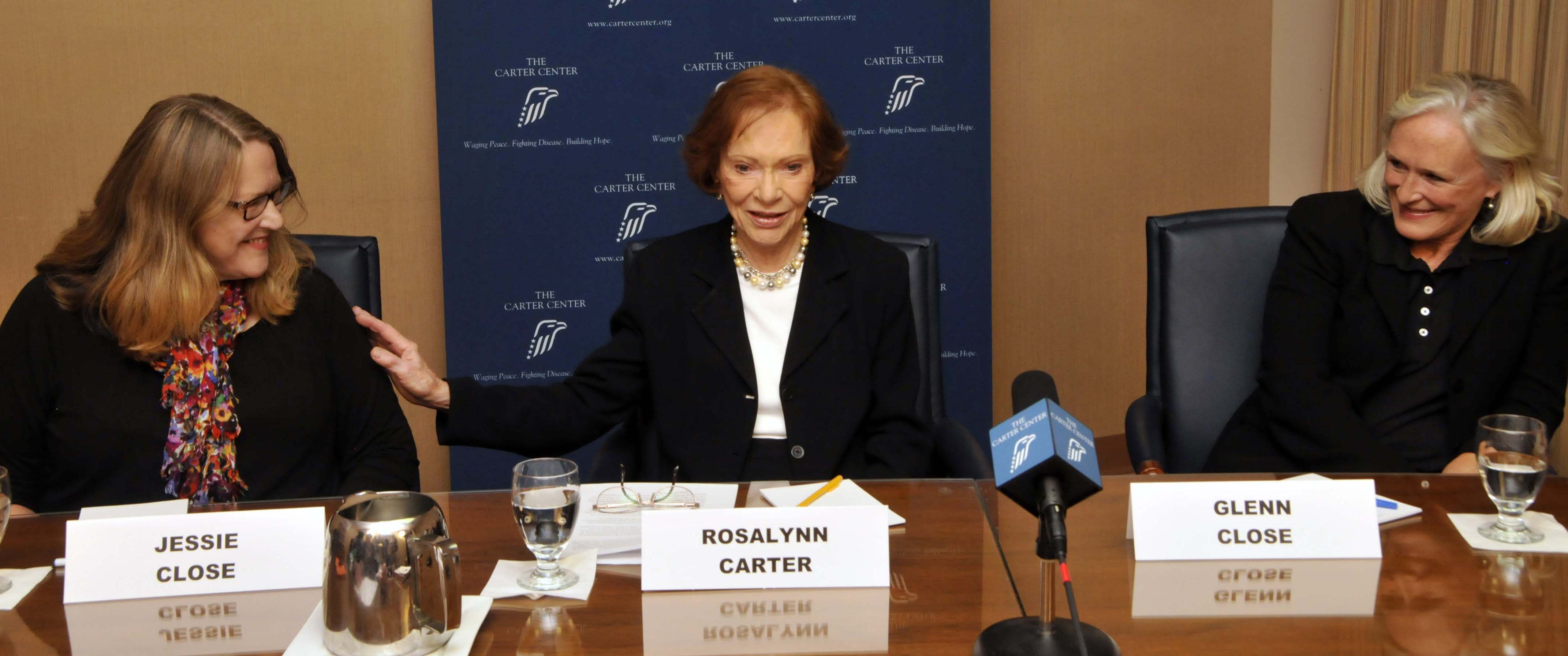
It takes guts to stand in the middle of New York City's Grand Central Station wearing a t-shirt that says "bipolar," especially when you're being filmed for a national public service announcement directed by Ron Howard. Yet, that's just what Jessie Close did in 2009, when she helped her famous sister Glenn launch Bring Change 2 Mind, an anti-stigma campaign aimed at removing misconceptions about mental illness.
"It was scary," Jessie says of the very public "outing" of her disease. "But it was glorious and freeing afterward."
As guests at the 28th annual Rosalynn Carter Symposium on Mental Health Policy at The Carter Center in Atlanta on Nov.1, both Jessie and Glenn Close, along with former U.S. First Lady Rosalynn Carter, sat down for an exclusive interview about how they're creating change and advancing social inclusion for the mentally ill.
For Mrs. Carter, who's worked for justice and proper treatment of people with mental illnesses since her pre-White House days (in the early 1970s when her husband, former President Jimmy Carter, was then Governor of Georgia) and now with The Carter Center, the Close sisters' story is important because it illustrates the positive impact of family support on outcomes for success.
"[They're] helping everyone understand how mental illnesses can impact someone's life and relationships," Mrs. Carter says of Jessie and Glenn Close. "Mental illness isn't what we see on sensationalized news stories or in movies. People with mental illnesses are sisters or friends, who have many gifts and can make important contributions to their families and communities with our support."
Jessie Close, 56, wasn't fully diagnosed with bipolar disorder and mixed-state tendencies until 2004, after decades of ups and downs, battles with alcoholism and a suicide attempt. "It was all family," she says of her support system on the road to recovery. Now "doing well" on a medication regimen and with regular check-ins from her sister and friends, she chronicles her days on a heartfelt and revealing blog at the Bring Change 2 Mind website, which along with its Facebook page, has become a safe space for people living with mental illness to share their struggles and paths to wellness.
For actress Glenn, 65, founding Bring Change 2 Mind (along with partners The Balanced Mind Foundation, Fountain House, and the International Mental Health Research Organization), was a way to learn more about her sister's illness and take action against discrimination.
The prejudices against the mentally ill are "similar to those" faced by African Americans before the Civil Rights Movement or by the LGBT community, she says.
"It helps that more of us are medically literate," Glenn Close says. "We know (if you have a mental illness) therapy and medication can lead to recovery and a full life. But stigma hasn't budged. The most effective way to end stigma is to meet someone who is living with a mental illness."
Glenn wishes she'd had more background knowledge about mental health while preparing to portray the psychotic Alex Forrest in the 1987 thriller, Fatal Attraction, a role for which she received one of her six Academy Award nominations: "When I was doing research for Fatal Attraction, neither of the two psychiatrists that I talked to brought up the possibility of a mental disorder. Amazingly, it didn't come up at all."
Hollywood has come a long way since the 1980s, and Glenn Close lauds fellow actress Claire Danes for making a bipolar character on TV (CIA agent Carrie Mathison on the current hit Showtime program Homeland) "realistic." However, Glenn herself has turned down three recent scripts because of the way mentally ill persons are handled in the writing. "It's easy to use mental illness as a plot point, but it's not responsible."
The bottom line: education, early intervention, community support, and love from friends and family are essential to bringing more understanding -- and less stigma -- to mental illness.
"We've learned that we have to change the way we look at it," Mrs. Carter says. "It's more than just the disease, it's the whole community."
"The most effective thing to change people's perceptions and behavior is personal stories," Glenn Close says. "If Jessie can sit next to you and say, 'I live with bipolar disorder and I am in recovery. I'm OK.'"

Photo: Rosalynn Carter (center) hosts Jessie Close (l) and Glenn Close (r) at the 28th annual Mental Health Symposium at The Carter Center on November 1, 2012. Credit: The Carter Center/P. Rohe. For four decades, Rosalynn Carter has worked to reduce the stigma surrounding mental illness. As First Lady, Carter was instrumental in the passing of the Mental Health Systems Act of 1980, which emphasized diagnosis, prevention and patient's rights. She co-founded The Carter Center in 1982 with her husband, former U.S. President Jimmy Carter, and today continues to provide leadership for policies that promote proper treatment and social integration of the mentally ill. Below is a highlights video from the 2012 symposium.
For more information about Jessie Close, Glenn Close, and their work to fight stigma, visit BringChange2Mind.org.
For more information about the Carter Center's work in the field of mental health, visit CarterCenter.org.
